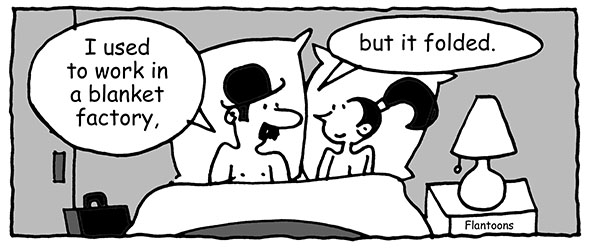
As many of you might already know, knowing how to spell will improve your reading and writing skills. That means you will have less problems with vocabulary and comprehension.
Sharpen up your spelling skills with this quiz. All you have to do is choose the correct spelling of the eight words below. Good luck!
Lesson by Krista
Look at how these sentences are linked:
1 Because it was raining, we stayed at home.
2 Because of the rain, we stayed at home.
3 Due to the rain, we stayed at home.
(Because + clause) – (Because of + noun) (Due + to + noun)
We often confuse adjectives that end both in –ed and –ing. (interested or interesting, bored or boring etc.)
Adjectives that end in –ed describe emotions – they tell us about how a person feels about something or even their opinion about something.
I’m surprised to see you.
He’s interested in fashion
I was bored during the lecture.
I was tired so I went to bed.
Third Conditionals are sentences with two clauses – an ‘if' clause and a main clause – that describe the past. They are used to describe ‘something that didn’t happen’.
We would have arrived on time if we had left earlier.
We left late so we arrived late.
If I had studied harder at school I would have gone to university.
I didn’t study very hard so I didn’t go to university.
So, we've covered similes… but what about metaphors?
Just like a simile, the non-literal figure of speech referred to as a metaphor also compares two things, but it does so in a more direct way, this time without using as or like.
The second conditional is a structure used to talk about impossible or imaginary situations.
If I won a lot of money I’d travel the world.
Where would you live if you could live anywhere in the world?
If he didn’t argue with everyone all the time, he would have a more relaxed life.
To form the second conditional we use: If+past simple and would+infinitive

Today's cartoon is based on two meanings of fold.
1 - When you fold a blanket, paper or cloth you bend it so that one part of it lies flat on top of another part.
"Origami is the traditional Japanese art of paper folding to make designs without cutting the paper."
"Fold up the clothes and put them away."
Here are some adjectives and the prepositions we use with them. There is no real system and so the only way to learn them is to treat them as a 'fixed combination' and record them as you meet them when you read or listen. There are many adjective preposition combinations which are not show here.
I'm good at learning languages but bad at maths.
He's terrible at expressing his ideas.
Do you enjoy watching movies? If the answer is yes, then I hope you get to watch them in English sometimes – it will help you improve your vocabulary!
Reading movie reviews is also a great help. Let’s take a closer look at positive and negative adjectives which are very frequently used:
As and Like are both used to compare situations or actions. But here are some differences:
We use as to talk about something we do or how something is used.
I worked as a graphic designer for eight years.
She used her jacket as an umbrella when it started raining.
'As adjective as' is used to compare things or people.
It's not as cold as it used to be.
He studied as hard as he could for the exam.